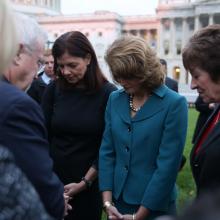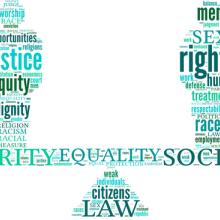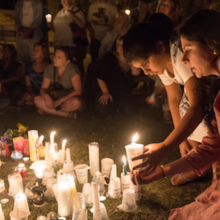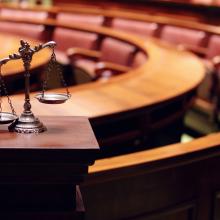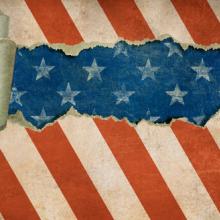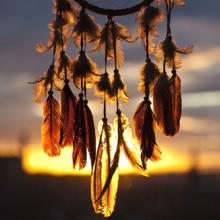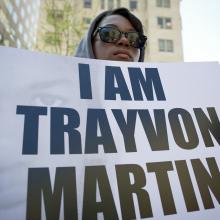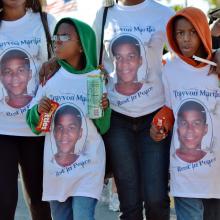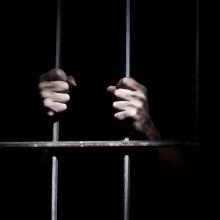racial justice
ONE RECENT WINTER day, Nora Howell stepped out of her house in the Sandtown neighborhood of Baltimore and took a walk down the street. People in the predominantly black community did double takes as this white woman promenaded past them in a sundress made of saltine and oyster crackers. Some stared in disbelief. One man doubled over laughing. In the corner coffee shop, one of the regulars warned Howell not to walk by any homeless people because they might just eat her up.
Later Howell, a community artist and director of the neighborhood Jubilee Arts program, set the video footage taken during her walk to Mister Rogers’ classic refrain, “Won’t You Be My Neighbor?” The piece, which emerged out of Howell’s ponderings on what it means to be white living in a black neighborhood, became another part of her answer to a call: to use art to address systemic racism and bring about the kingdom of God.
From Race Riots to White Suburbia and Beyond
In 2001, Howell was an eighth grader living in a biracial community in urban Cincinnati. When race riots erupted after a young black man was shot fatally by a white police officer (sound familiar?), her family took to the streets on a prayer walk through the riots. Howell remembers being shocked and terrified, thinking, “Why do we still have race riots? Cincinnati is so far behind the times.”
In the aftermath, Howell talked with peers at school on the reality of racial tensions and observed with curiosity how white and black churches throughout the city responded. She realized race riots weren’t just a relic of the ’60s. “When you lived in a place where different racial groups interacted daily, [racial tensions] could no longer be denied or ignored,” she said.
Yet when Howell moved to suburban Chicago to attend Wheaton College, conversations on race were largely absent. “I found that very odd,” she said. She got involved in a campus group to promote awareness of racial injustice.
There are so many people that have gone before me, people that have sacrificed their lives in pursuit of justice and equality. Because of this, I feel a deep sense of commitment to honor them by standing for some of the same things that they did. I am in complete awe of two things that connect deeply for me. The first is the cross and how Jesus gave his life for us all. The second is my ancestors who somehow understood Jesus’ sacrifice and passed it onto me through intense persecution.
I can’t say that I know persecution like my parents, grandparents, and great-grandparents knew. I have been back to southern Alabama many times for family reunions and visited slave graveyards where relatives are buried. This compels me to be and do more with my life. I can’t say I understand why Jesus would choose to become human, walk this earth as a human being, and then die at the hands of his own creations to save those who were crucifying him. However, I do know it pushes me to be and do more with my life. I feel like I would let them down somehow if I didn’t take responsibility for addressing injustice with my life.
My life is not my own. I am the product of sacrifice. I am here because of those who saw beyond themselves and thought personal sacrifice was worth giving up to allow justice to take hold. I am here because Jesus modeled something completely illogical on the cross and then some of my ancestors took that example seriously and repeated it. I have no real right to the life I live. My only recourse is to continue the tradition handed to me in the same way.
In the short three months that I have been at Sojourners as the director of individual giving, I’ve been humbled and inspired by the countless social justice activists who make up our community. In these three months, I have witnessed activism for immigration reform, a vigil for those most affected by congressional dysfunction, organizing for climate change, a prophetic stand for racial justice, the launching of a new campaign to empower women and girls, and much more.
Adaptation is how a bitter and broken South survived its own worst instincts after the war. Progressive pockets emerged in college towns and later in large cities. Hungry for Northern business, the region became less racially polarized. In time, a black man could become mayor of Atlanta and another could become the Episcopal bishop of North Carolina.
The Rev. Martin Luther King, Jr.’s dream of 50 years ago came to seem possible. Distant, yet possible.
But now the dream has receded. The fact of a black president seems to have reopened a pulsing vein of racism. Operating under cover of fiscal austerity, vengeful state politicians are gutting decades of programs that helped the South move forward by helping blacks and Latinos to have a chance.
No more affirmative action, they say; no more dark-skinned citizens flocking to voting stations; no more voting districts shaped by fairness; no more protections from ground-level aggression against people of color.
Once again, as happened in the 19th century, impoverished whites who should be lining up to resist predatory behavior by the moneyed class are being turned against their own best interests by race politics.
It all sounds so… demanding. Sell your possessions and give to the poor. “Be dressed for action." Imagine yourselves as slaves who remain ready for their master’s return — not knowing when it might come.
Luke’s Gospel is big on demanding. In Luke 9:57-62, Jesus encounters three would-be disciples. And each receives a warning that would vanquish enthusiasm like an ice-cold shower.
THIS SUMMER, two Supreme Court outcomes dramatically affected the reality of the words “Equal Justice Under Law.” In the first, a key component of the historic Voting Rights Act of 1965 was struck down, jeopardizing equal justice under the law especially for black, Latino, and low-income people whose voting rights have historically been assaulted and have continued to be suppressed as recently as the 2012 election. Efforts to increase barriers to voting for people of color, especially those with lower incomes, are already underway in several states. The Supreme Court’s decision was morally shameful.
The decision revealed how politically partisan this bench has become. The conservative justices have aligned themselves with the extreme right-wing politics that has taken over today’s Republican Party—one that has deliberately encouraged and practiced voter suppression against minorities, low-income people, the young, and the elderly.
America has made great progress on racial justice because of the tireless and courageous efforts of many. But the illusory idea of a “post-racial” America is exposed as a lie by this nation’s criminal justice system, the many recent attempts at racially based voter suppression, and now this decision by the Supreme Court.
My father is white, and has lived a different story. My son was the same age as Trayvon Martin when Martin was killed in Florida in 2012. My white teenage son lives a different story. But when I got on a flight early on Sunday morning following the verdict, I was seated next to an African-American woman with six children. The weight of the verdict was on her face, and she showed me a photo of her three sons, all wearing hoodies, for whom Martin’s death and the subsequent verdict hit very close to home. This is their story.
A YOUNG MAN of American Indian heritage said to me: "Imagine growing up an American Indian halfbreed with the blood of Caddo, Choctaw, and Chickasaw tribes in you ... Imagine growing up ... knowing that you belong to a culture long native to this land before the white man 'discovered' it. Imagine trying to assert your identity when the majority of society affirms that 'Indians are a dead race.'" ...
With words of dismissal, the politicians wipe out the tribes' meaning and deface them of their honor. With words, they strip American Indians of race, culture, philosophy, reason. With words they cover the Indians with a gloss of alienation and meaninglessness, leaving them hollowed-out entities, repeating over and over the rules of a society that was never their own.
Southern Baptist leaders will investigate whether their top ethicist and public policy director plagiarized racially charged remarks about the Trayvon Martin case that many say set back the denomination's efforts on racial reconciliation.
Richard Land, who leads the Ethics and Religious Liberty Commission for the Southern Baptist Convention, was accused of lifting remarks for his radio show that accused Democrats and civil rights leaders of exploiting the case of the unarmed Florida teenager who was shot and killed by a volunteer neighborhood watchman.
Even though Land has apologized for both the remarks and not attributing their source, the commission's executive committee said it was obligated “to ensure no stone is left unturned.” An investigatory committee will "recommend appropriate action" to church leaders.
Today is a holiday in the District of Columbia, although primarily observed only by the D.C. government, and likely unknown to the rest of the country. But it’s a commemoration worth noting.
One-hundred and fifty years ago, April 16, 1862, President Abraham Lincoln signed the District of Columbia Emancipation Act, freeing more than 3,000 slaves within its borders. It predated the more famous Emancipation Proclamation, which came nearly 10 months later on January 1, 1863.
Yet, while legal slavery is long gone, economic disparities are vast and growing. The income gap is one of the widest in the country, with a white per capita income more than triple that of African-Americans. The poverty rate is 20 percent, 30 percent for children,
Politically, all Washingtonians, regardless of race, remain disenfranchised – we have no elected voting representative in Congress, while Congress retains veto power over our budget. That leads to it using us to enact their pet ideas – repealing a variety of legislation duly passed by our City Council and Mayor.
For D.C. residents, today is a day to remember and celebrate the end of slavery, while renewing the struggle for economic justice and full representation as citizens of the United States.
Today I search my soul along with many Americans who are discussing the Trayvon Martin tragedy. These conversations can range from news blogs clamoring for justice to benign disputes about the facts of the case by office water coolers. One of the more challenging conversation threads recently came in the form of a status update on Facebook. My colleague, Efrem Smith, lamented:
"Shouldn't the young black males who are victims of black on black crime get the same attention as Trayvon Martin? I say yes."
I believe Efrem's statement could have us conversing for months to come should we be bold enough to lovingly engage.
I don't want to say too much. I don't want to over-explain. I know that leaves lots of room for misinterpretation. I just want to ask you to wrestle with a few questions.
I was asked last week what my greatest fear as a father of a black boy is in light of the Trayvon Martin murder. My greatest fear for my children is the cautious regret I see on the many faces that can’t help but leave open the possibility there may be some justification for this tragedy. Rest assured George Zimmerman and his supporters will exploit this deep-seated immutable suspicion, just like Susan Smith did so many years ago.
Bryan Stevenson, founder and executive director of Equal Justice Initiative, shares stories about America's justice system and illustrates the imbalance of justice along racial lines.
"One of out three black men between the ages of 18 and 30 is in jail, in prison, on probation or parole," Stevenson said in his talk. "... We have a system of justice in this country that treats you much better if you're rich and guilty than if you're poor and innocent. Wealth, not culpability, shapes outcomes."
The fight against mass incarceration is joined by an emerging faith-based movement.


